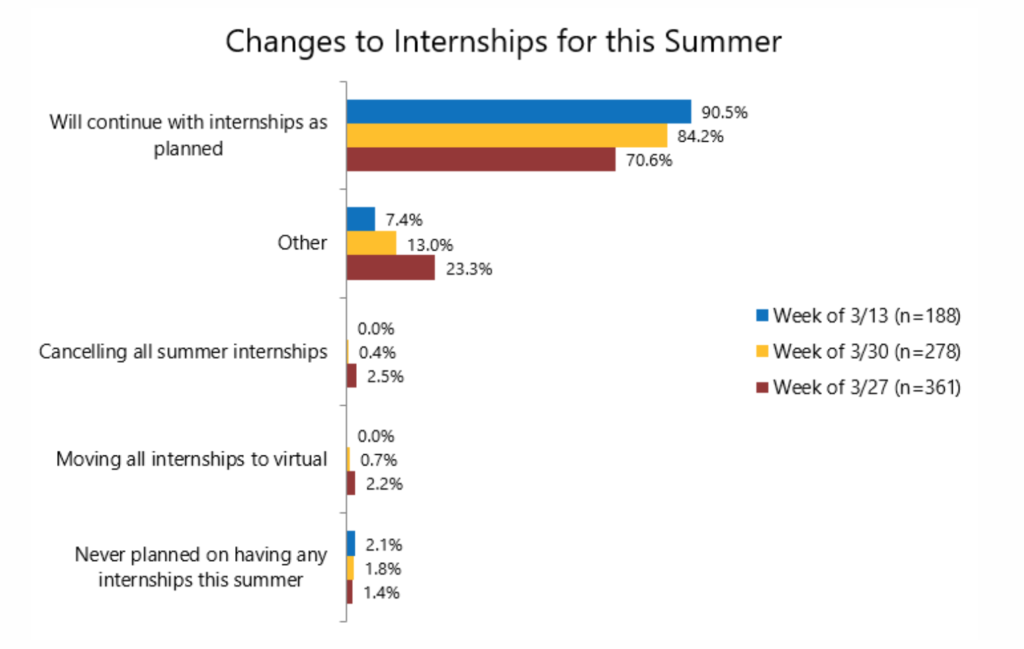
At this point in the academic year, business majors are usually ramping up for finals, with summer internships on the horizon. But this summer, instead of potentially moving to a new city and starting a new internship in a new setting, the majority of biz students will be heading home before a delayed internship start, a totally virtual internship, or both.
According to an ongoing survey of employers by the National Association of Colleges and Employers (NACE), 65% of employers plan to change their summer 2020 internship programs in some way as a response to the spread of coronavirus (COVID-19).
The survey, which opened on April 1 and will continue to run throughout the rest of April, has had just over 130 employers respond. Of those, 35% report that they already plan to shorten their summer internships by delaying the start. Another 29% said they plan to move all internships to a virtual format. And 15% said they plan to reduce the number of interns they take.
LARGE ESCALATION IN COMPANIES ALTERING SUMMER INTERNSHIPS
NACE also held conducted a similar survey in March and reported updated results each Friday. The number of employers moving internships online increased significantly as the month progressed and the spread of COVID-19 escalated. When NACE first reported data during the week of March 13, only 9.5% of the 188 employers that had responded said they planned on changing their summer internship. No employers reported canceling internships or moving all internships online.

NACE Study
But by the end of the month, the percentage of responding employers — 361 at that point — that planned on changing their summer internship jumped from 9.5% to 29.4%. Some 2.5% reported they planned to cancel their internships for the summer, and another 2.2% reported moving all internships to virtual. Nearly a quarter (23.2%) listed “other” as their planned changes for a summer internship. Respondents are allowed to update their responses until the close of the survey. So, a company could’ve reported no planned change before March 13 and changed it to virtual or canceled by March 27.
“NACE began polling employers in March and has seen a steady push toward moving internships online — rather than holding them at employers’ sites during the summer, as is typical — or limiting them in length and size,” a report from NACE said.
“Initially, 90% of responding employers expected to maintain their internship programs without change; by the last week in March, that number was down to 74%,” the report continued. “This morning (April 1), results were even more dramatic: Just 35% reported moving forward with on-site internships as planned.”
But now, as stated above, that number has catapulted to 29% moving fully virtual.
PWC ALREADY MOVING 3,500 INTERNSHIPS ONLINE THIS SUMMER
One major employer to move internships fully online already is PwC, which will move its 3,500 undergraduate internships to virtual this summer. PwC will also delay the start of its internship from early June to early April but will run it a bit later to mid-August.
“I’ve been talking to students about planning for unexpected changes should they arise in the next few weeks or months, including finding ways to use their business skills to support their local communities, conducting research and taking classes over the summer,” says Talia Schatz, director of the Undergraduate Career Development Center at Georgetown University’s McDonough School of Business. “There is uncertainty from both students and employers, so it’s challenging to predict exactly how this will unfold.”
Schatz says she’s also heard anecdotally from “many students” that the companies they’re planning on working for this summer have written to let them know the internships are still moving forward. “Although I think it would be prudent to expect that they will either be virtual or the start date may be pushed back,” she advises.
As uncertain and fluid as this situation is, Schatz says so far it seems to be better than what happened following the Great Recession in 2008 and 2009.
“I do think we’re in a better place than we were in 2008 and 2009,” Schatz says, “because many more companies are better equipped to move their programs to a virtual space.”
We’ll continue to monitor the NACE survey on Fridays through the rest of April and update this article as major changes or trends occur.
DON’T MISS: CONSULTING PAY: WHAT UNDERGRADS AND MBAs EARNED IN 2019 or STARTING SALARIES & BONUSES FOR BUSINESS MAJORS IN 2019











Questions about this article? Email us or leave a comment below.